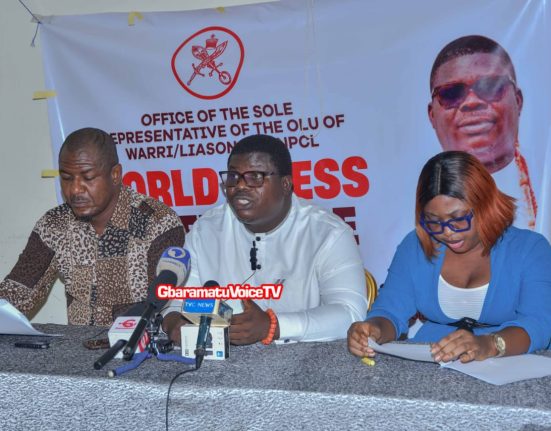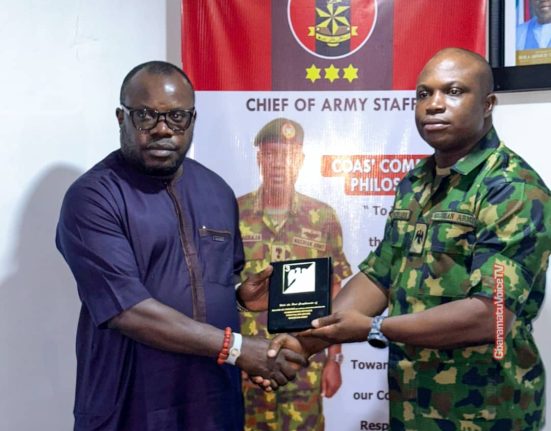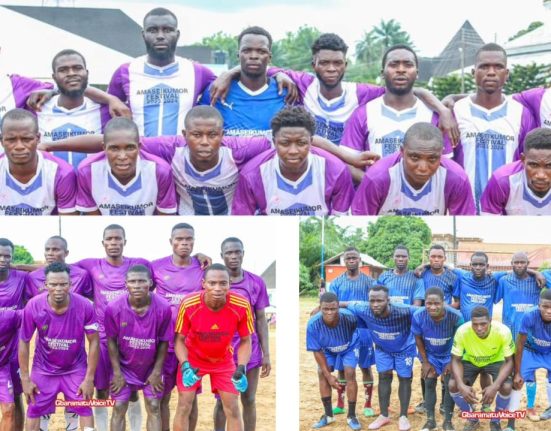Being a paper presented by Prof. Tosan Harriman at the 46th birthday Anniversary Lecture of High Chief Government Oweizide Ekpemupolo, Ibe Ebidouwei of Ijaw nation on Wednesday 12th April, 2017
To Victoria and the Ekpemupolo family; to His Excellencies Gov. Okowa and Deputy Governor Kingsley Otuaro, and members of their Government; to Members of the National Assembly, past and present; distinguished guests –I think I should invoke the Ijaw maxim which says that when you have several dignitaries to salute, you can either go on doggedly and call each man by his title, or you can wave your hand over the crowd and speak the formula ‘every man and his own’ and that magic phrase ‘ kemesese haadooh’ absolves you from the obligation to remember and pronounce sundry salutations. It is a singular honor to be with you today, to celebrate a life unlike any other, and to patently evaluate originating issues consequent upon, perhaps, the cognitive mention of that life. I am glad that I did not have to decline, pleading the truthful excuse that I am, unfortunately, held down by a relapse into a quotidian voyage occurring in the apex of my physiology, you know that set of a hard bony enamel- coated structure fitted in the jaw, whose painful predilection, set my path on a long walk with pain and grime into the heart of darkness, with no prospect of day near, so it seems, and with the first sign of the glimpse of twilight at a home in the center of Baobab country, made out to the Dental Hospital to implore for an expert intervention, who, in a flurry of informed evaluation, espied a growing cause of concern, an abnormal blood flow through blood vessels (arteries) at higher than normal pressures, peremptorily advised an extraction from the carapace of that troubling site. The Doctors did what they are trained to do and sooner or later here I am and I am grateful to still have the reflexes to fling literal pebbles, probably, in a way too soon, to set the tune for today’s concourse.
To the people of Ijaw Nation – and the Gbaramatu kingdom in particular — the world thanks you for sharing Tompolo with us. His struggle was your struggle. His triumph was your triumph. Your dignity and hope found expression in his life, and your freedom, your wellbeing is his cherished legacy. History from time to time, brings to the fore the kind of leaders who seize the moments, who cohere the wishes and aspirations of the oppressed. Such is Tompolo, a fitting product of this generation, a proud representative of the reawakening of our beleaguered people
It is difficult to eulogize any man — to capture in words not just the facts and the dates that make a life, but the essential truth of a person — his private joys and sorrows; the quiet moments and unique qualities that illuminate his soul. How much harder to do so for a giant of history, who moved his people toward justice, and in the process created a niche that inspires discussions on the resource history of the Ijo ethnic nationality people of Nigeria.
Born in April 1971 in the context of two historical watersheds- the flip side of the Nigerian civil war and Easter, which all Christian people the world over celebrate, a boy raised paddling Canoe and tutored by elders of his Okerenkoko Community – Tompolo had come of age in that bleak period of discouragement and despair. A young man with a sharp intellect and a flair for organization and leadership. Realizing the need to raise the sagging morale of his people, to raise their consciousness and self-esteem, Tompolo would emerge as a taciturn crusader whose essential philosophy is to position culture at the center of the agitation for resource control more than any other person had done before.
Biblical Scholars tell us that the Old Testament prophets performed a dual function – to foretell and to forth tell, to predict the future and to speak out against the ills of the present, Tompolo exemplified and fulfills that mandate in his life and works. As one who has lived most of his youth and adult life around Warri, kokodiagbene, Egwa, Kurutie, Okerenkoko, Oporoza, and has witnessed the ruthless despoliation of the land, it seems to me more apparent that he has a good chance of achieving the quality and the authority of prophetic utterance. He was there and grew up there. He knew the poverty, the despair, the alcohol, the squalor, the pain, the acid river. He saw how the mangrove of the equatorial rainforest turned into a mire of quick sand because of the activity of multinational exploration gangs. He knew Shell and Chevron Texaco, the Joint Task force and their ways. He knew the government obsession with oil and the general absence of any critical plan to generate a cannon fodder to curtail the effect of environmental degradation. He knew where they come from and as in this instance, the nomenclature and the cognomen of majority of those who own the oil wells dotting every part of the Niger Delta. Add all these to his brilliance as a ‘son of the soil,’ as we are accustomed to say in Nigeria and you have a seer and prophet of the Nigerian resource malaise. And as Oscar Wilde once observed ‘ a man should be the fulfillment of prophecy, the realization of some ideal, and his work, the conversion of an idea into image.
Although, we hear about a cynically provocative, and veiled attempt by a great many misinformed people, some who knew Tompolo and many who don’t, to try to separate his character from the context of his ideals and orientation, and to justify their description of him with callous perfidy, or with a grotesque combination of idiocy and delinquency, the legacy of Tompolo will grow in this Nation and in Africa, for the clarity of his political thought, and for his physical and moral courage. You will also, I assume, inevitably hear criticisms and reservations concerning his strong posturing in the oil River resulting in alleged kidnappings of expatriates and at some point the killing of eleven soldiers in the Gbaramatu Creeks. You will also hear, I am sure the handy phrase ‘militant and thug’ in describing Tompolo. But facts speak different language- there is need to ask what are eleven soldiers doing in the creeks of Gbaramatu? Can eleven soldiers constitute into a battalion to undertake expeditionary military campaigns? I am sure that other than defending the Nigerian State, which is at the core of any effective soldiering and of protecting the maritime integrity of its coastal littorals, the eleven soldiers who died, God rests their souls, in the Gbaramatu Creeks may have, at some point, metamorphosed into a pseudo adventurist force and perhaps went there looking for a riband to stick to their escutcheon and died they did.
The assumption or is it notion that you cannot democratize accumulation, which appear to reflect in the conduct of the Government towards the local people, and the fact that many agents of government, seen in the emerging comprador bourgeois class, who don’t know how hydro carbons or their rated loggings look like but yet profit by it, who swim in the cult of the personality and deification of political leaders, the culture of conspicuous consumption and instant gratification which give birth to wholesale corruption- a culture that has spread and established itself in the walls of the halls of power, in proportion to the increasing volume of conventional rhetoric emanating from every aperture of the ruling elite to justify its actions, in a nation where the principle of ‘gerrymand democracy’ and the politics of deployment and redeployment is the main inspiration of its leaders, there will be this palpably ominous sense that nothing is available for any upstart anywhere. I have seen people who have opted to check out like the mythical ‘Andrew’ because the job for which they were qualified, were given to political cronies and family members of the ruling elite, who had zero qualification, but who receive huge salaries while their jobs were done by highly paid consultants. Nigeria has the propensity to be a world leader, whose economy could support jobs for many people in Africa, but is unfortunately lagging behind because of the veiled practice of the uncouth concept of what my friend Majakathata Mokoena refer to as crony capitalism, a capitalism that is based on who one knows in the political body rather than on those who are well disposed to entrepreneurship and new business formation- that include people who have gone to school to study business and other technocratic qualifications so that they can contribute positively to the growth of the country’s economy but whose skills, talents and abilities cannot be tapped into because economically inept people are put into position they barely understand.
You will expect that in a country of over 200million people where the notion of development is defined by the dubious principle that the center must deliver development to the periphery which must remain a passive beneficiary of whatever services and materials are delivered, will tend to negate the peoples roles as makers of their own history. This concept of delivery can only create and reinforce a dependency mentality on the people, as it would seem, as they have been socialized to think that without Government delivery shoes are going to drop off.
This noxious distribution of roles from a people centered government to a government by deployment can only breed the arrogance of power which goes hand in glove with corruption. And indeed, it became a good sign as it brought with it its own contradictions because as a people, we have not been known to exercise revolutionary vigilance over the policies of our elected representatives, who in order to safeguard their positions, incorporate the youths into the organ of a monolith whose function is to advance the cult of the personality of the political leader. He becomes the chosen one, the anointed one and even the savior. Megalomania begins to unfold and political leaders took on the form and nature of the infallible. The fate of the people also became invariably sealed in the hands of these corrupt buffoons who brooked no opposition. Even trade unions you expect to maintain some degree of independence become mere labor desk of the ruling parties. These unedifying tragicomedies of disruption ran its time and remain the main inspiration of the bungled political leadership. It meant that those who occupy the seat of decision making at some point in the devolution of its scurried identity, inadvertently became victims of its own cavalier description of socio political representation and in the process lost every sense of reconciling its theorizations with practical situations which sadly enough meant, by their own choosing they climbed aboard the conveyance of evasion, bound for the bunkers of denial and sudden death. But it is more serious than that, in the intermission, it created a spirit of bitterness and a sense of frustration in the people, and with growing poverty and the avalanche of disconsolate and strident calls of ‘ na who you help’, if I may borrow from Warri syllabi of words, you will expect bright minds like those of Tompolo to leverage on this paranoia and take their destinies in their own hands.
As a University Teacher, you should expect one to know in the main, that teaching at any level of academic proficiency entails critical thoughts which takes its appeal to the cognitive, affective and psychomotor domains, and it cannot be otherwise. The application of the relevance of these domains in the teaching experience demands steady interaction between the teacher and his student but where only the teacher does the teaching and the student does the listening without cross evaluation of the transmitted ideas, the teaching process is assumed, and so it seems, not to be consummated.. Except the roles change sometimes, you cannot effectively claim to have landed an effective teaching experience. The Nigerian Government cannot be doing all the talking. She must also listen to other critical stakeholders who have informed opinion on all the issues in their domain.
To be Continued..
Prof. Tosan Blessing Harriman, is a Professor of Comparative Dialectics and Pro-Consul, Centre for the Advancement of democratic and People’s Right, Bayero University, Kano.
Support Quality Journalism in the Niger Delta Region
Join us in our mission to bring development journalism, cultural preservation, and environmental awareness to the forefront. Your contribution makes a difference in the lives of the people of the Niger Delta. Donate today and be a part of the change!










Leave feedback about this
You must be logged in to post a comment.